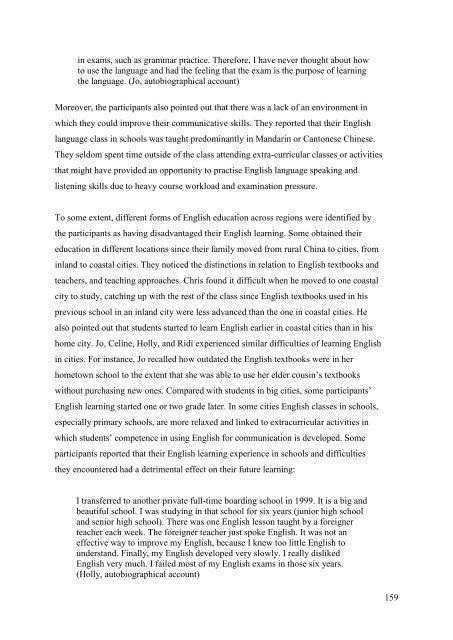The challenge of academic writing for Chinese students within ...
The challenge of academic writing for Chinese students within ...
The challenge of academic writing for Chinese students within ...
You also want an ePaper? Increase the reach of your titles
YUMPU automatically turns print PDFs into web optimized ePapers that Google loves.
in exams, such as grammar practice. <strong>The</strong>re<strong>for</strong>e, I have never thought about how<br />
to use the language and had the feeling that the exam is the purpose <strong>of</strong> learning<br />
the language. (Jo, autobiographical account)<br />
Moreover, the participants also pointed out that there was a lack <strong>of</strong> an environment in<br />
which they could improve their communicative skills. <strong>The</strong>y reported that their English<br />
language class in schools was taught predominantly in Mandarin or Cantonese <strong>Chinese</strong>.<br />
<strong>The</strong>y seldom spent time outside <strong>of</strong> the class attending extra-curricular classes or activities<br />
that might have provided an opportunity to practise English language speaking and<br />
listening skills due to heavy course workload and examination pressure.<br />
To some extent, different <strong>for</strong>ms <strong>of</strong> English education across regions were identified by<br />
the participants as having disadvantaged their English learning. Some obtained their<br />
education in different locations since their family moved from rural China to cities, from<br />
inland to coastal cities. <strong>The</strong>y noticed the distinctions in relation to English textbooks and<br />
teachers, and teaching approaches. Chris found it difficult when he moved to one coastal<br />
city to study, catching up with the rest <strong>of</strong> the class since English textbooks used in his<br />
previous school in an inland city were less advanced than the one in coastal cities. He<br />
also pointed out that <strong>students</strong> started to learn English earlier in coastal cities than in his<br />
home city. Jo, Celine, Holly, and Ridi experienced similar difficulties <strong>of</strong> learning English<br />
in cities. For instance, Jo recalled how outdated the English textbooks were in her<br />
hometown school to the extent that she was able to use her elder cousin‘s textbooks<br />
without purchasing new ones. Compared with <strong>students</strong> in big cities, some participants‘<br />
English learning started one or two grade later. In some cities English classes in schools,<br />
especially primary schools, are more relaxed and linked to extracurricular activities in<br />
which <strong>students</strong>‘ competence in using English <strong>for</strong> communication is developed. Some<br />
participants reported that their English learning experience in schools and difficulties<br />
they encountered had a detrimental effect on their future learning:<br />
I transferred to another private full-time boarding school in 1999. It is a big and<br />
beautiful school. I was studying in that school <strong>for</strong> six years (junior high school<br />
and senior high school). <strong>The</strong>re was one English lesson taught by a <strong>for</strong>eigner<br />
teacher each week. <strong>The</strong> <strong>for</strong>eigner teacher just spoke English. It was not an<br />
effective way to improve my English, because I knew too little English to<br />
understand. Finally, my English developed very slowly. I really disliked<br />
English very much. I failed most <strong>of</strong> my English exams in those six years.<br />
(Holly, autobiographical account)<br />
159


